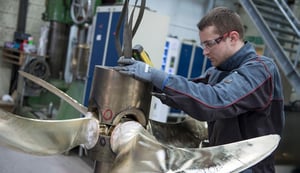Updated 27 November 2025.
Looking for how to better plan and prepare for your asset's inevitable downtime?
In the maritime industry, where the health of your assets directly impacts operational efficiency, taking a proactive approach will help you maximize the up-time and production of your vessels.
In this article we will look at how you can develop an intelligent and well considering part inventory, and what options you should explore to maximise your up-time and production of your vessels.
What to Always Have On Hand?
There are three main categories of spare parts you should always have on hand, know intimately the specs of, and have a predictable supply of:
- Bespoke custom parts for your tailored system
- Lubricants and oils
- Consumables, like filters, gaskets, seals and sensors
Let's go through some items within these groups:
Bespoke/custom parts
Propellers, shafts and other mechanical parts of many high-end propulsion systems are tailored. In turn, it is without a doubt the component group that will have the longest lead-times, should you need a replacement.
As has been discussed in this blog previously, nothing beats a tailored vessel in terms of efficiency, but that also means that any replacement must be made to your specifications. This can cause your vessel to be out of service for months while the part is manufactured and shipped.
Suggested reading: 5 Important Things to Consider When Choosing a Propulsion Manufacturer
Lubricants and oil
Lubricants and oils play a crucial role in the efficiency and durability of your system. They operate in various ways, from reducing friction to preventing corrosion, but regardless of their specific function, following supplier recommendations is essential to ensure maximum uptime.
By periodically sampling the oil and analyzing it for contaminants and appropriate levels, you can effectively monitor the health of your gear system.
If the oil quality meets the specified parameters, you may be able to postpone the oil change. Regular oil testing and maintenance help ensure the reliability and performance of the system.
Having essential fluids available enables crew to perform maintenance according to supplier’s manual, as well as ensuring quick access in case of emergencies or routine maintenance needs.
Sensors
Most sensors require calibration specific its use-case. Setting the zero-values and knowing whether they should consider pressure increases or decreases might sound self-evident, but it’s not uncommon that the considerations stop at whether it fits and handle the overall pressure-range. At best you will have alarms sounding too often. At worst, not at all.
We recommend checking sensors and alarms regularly. This is something both Servogear and our service partners can perform on yearly inspections. To often we have seen breakdowns which should have been prevented at an earlier stage, due to a sensor system not working correctly.
Filters
Filters play a vital role in removing contaminants and impurities, ensuring that the system operates smoothly and efficiently.
By using filters specified in the maintenance manual and recommended by the supplier, you can minimize the risk of potential issues and ensure that the filters are tailored to meet the specific requirements of the system.
Having filters available onboard allows for quick replacements or installations as needed, reducing downtime and enhancing reliability.
By following these recommendations you can maximum your uptime, enhance reliability, and prolong the lifespan of your equipment.
Read more: How To Limit Downtime And Cost With Proper Maintenance On Your Vessel
Communication is Key
It all starts with the source, your supplier. They will always be the most qualified to say what your vessel needs, and close communication has benefits way beyond that. Once you engage in dialogue with them, three major benefits make themselves apparent:
- Quicker service through certified partners in your area or region.
- Improved forecasting of expenses and OPEX estimates (even years ahead).
- Part lists, training and consultation for low-level maintenance you can perform yourself.
Whether you have your own service infrastructure or wish to utilize that of your supplier, close communication from the beginning is invaluable. Remember, they wish to see your vessel in tip-top operation. They can also offer training to crew for smaller regular service.
Assessing Your Specific Needs
Your specific needs depend on your capacity, operations, and many other factors. We have collected a few questions that should be answered when assessing your own needs and when entering a dialogue for a service agreement.
- What is the acceptable downtime?
- Do you have back up vessels to substitute your main assets during an overhaul/service?
- Have you compared the performance data with other sea trials?
- Have you evaluated latest reports and are prepared for unexpected findings?
- Do you have the facilities and expertise in your organisation to take care of it yourself?
- Where are the nearest facilities or qualified personnel?
- Do we have the correct service spares available?
This could mean a difference of 8 weeks downtime while waiting for a bespoke component, to a few days, with a technician waiting on the pier with your part.
Read more: Future Of Propulsion Technology: How To Stay Competitive In 2030
Conclusion
Taking a proactive approach will help you maximize the up-time and production of your vessels.
By entering into dialogue with your supplier early, you can avoid both common causes of downtime and repair delays, and have what you need on hand quicker. Servogear and our service partners can help you set up spares in your own stock, as well as what to have available at your service partner.
Reach out to our dedicated Service team to start planning.
Three categories are essential:
-
Bespoke/custom parts tailored to your system
-
Lubricants and oils required for optimal performance
-
Consumables such as filters, gaskets, seals and sensors
These items support both routine maintenance and emergency repairs.



